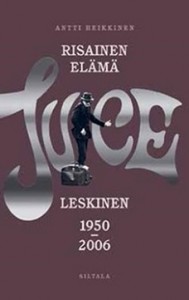
Juice taisteli itsensä kanssa – miehet (ja naiset) kertovat
Esitellessään Antti Heikkisen tuoreen elämäkerran Juice Leskisestä Iltalehti väittää, että kirja ”paljastaisi” Leskisen juoneen itsensä hautaan. Tosiasiassa se on yhtä suuri paljastus kuin se että Leskinen oli kotoisin Juankoskelta ja kertoo vain, että historiattomuus ja pinnallisuus ulottuu mediassa muihinkin kuin yhteiskuntaa ja maailmanpolitiikkaa käsitteleviin toimituksiin. Tämän Juicen pitkän tien hänen terveytensä täydelliseen romahdukseen Heikkinen kuvaa vain yksityiskohtaisemmin ja puhuttelevammin kuin on aiemmin tehty.
Antti Heikkinen on esikoisteoksellaan Pihkatappi kiitosta ja palkintoja kerännyt kirjailija, näyttelijä ja toimittaja ja osaa arvioida ja käsitellä sekä Juicen persoonaa että tuotantoa oivaltavasti ja rehellisesti. Savolaisuuskin on ollut avuksi Juicen suku- ja kotitaustan kuvauksissa. Juice muusikkona jää kirjassa Juicen runoilijan ja sanataiturin roolien varjoon. Heikkisen sympatiat ovat Juicen puolella, mutta se ei estä häntä käsittelemässä Juicen persoonan ikävämpiäkin puolia, ei vain alkoholismia vaan myös ihmissuhdeongelmia, jotka ilmenivät hänen kolmessa avioliitossaan ja lukuisissa muissa naissuhteissaan sekä vaikeuksina rakentaa suhdetta omiin lapsiinsa.
Heikkisen kuvaama Leskinen on liki kirjallinen ja kielellinen nero, omasta lahjakkuudestaan hyvin tietoinen ja sen epäilijöille pitkävihainen taiteilija, mutta samanaikaisesti myös ujo ja epävarma persoona, jonka monet sanoitukset kertovat lopulta hämmästyttävän paljon hänen itse-epäilystään, uskonetsinnästään ja ihmissuhdeongelmistaan. Itsetietoisuus näkyy Juicen yhteiskuntasuhteessa hänen katsoessaan olevansa muita koskevien käyttäytymisnormien yläpuolella eikä hän antanut juurikaan armoa minkään suunnan politiikalle tai poliitikoille. Erityisesti hänen hampaissaan oli sosialidemokratia, vaikka se ei estänyt häntä jollain lailla arvostamasta Kaarina Suoniota ja minua. Toki Juicella oli paljon sekä sanoituksiin että hyvien päivien lavaesiintymisiin ja yleisön kanssa vuorovaikutukseen liittyvää huumoriakin, joka kätki hänen vakavan puolensa monien fanittajien ymmärryksen ulottumattomiin.
Taiteilijaelämäkertoja voi tehdä monin tavoin. Yksi on perustaa koko kirja muiden kertomuksille ja pitkille sitaateille, toinen on perusteellinen ja perinteinen historiantutkimuksen menetelmiin nojaava tapa, josta esimerkkinä on Tellervo Krogeruksen mammuttimainen teos Matti Kuusesta. Kevyempi ja pinnallisempi tapa on ”legenda jo eläessään” tyyppinen kirjallisuus, mihin sarjaan aiemmat Juicesta kertovat kirjat kuuluvat. Sekin genre voi tosin tuottaa helmiä, mistä hieno esimerkki on legenda-sarjassa julkaistu Erno Paasilinnan kirja Timo K. Mukasta.
Antti Heikkisen Juice Leskinen elämäkerta yhdistää piirteitä näistä kaikista. Se perustuu noin sataan haastatteluun, joista otetut pitkät sitaatit täyttävät jo noin neljäsosan kirjan sivuista. Juicen levyt, sähköiset ja painetut haastattelut ja kirjat sekä parikymmentä muutakin kirjaa löytyvät lähdeluettelosta, mutta varsinaisia arkistolähteitä ei Heikkinen ole käyttänyt. Ainakin Juicen kahnaukset viranomaisten kanssa jättivät tällaisia lähdemerkintöjä, jotka olisivat voineet tuoda enemmän tietoa muutoin ulkoisesti lähes askeleen tarkkuudella seuratun Juicen elämän kriittisiin vaiheisiin. Voi olla että kirjan lukuarvo olisi joidenkin mielestä vähäisempi, jos lainauksia olisi reilusti karsittu ja niiden sijaan lisätty haastattelujen antia kriittisemmin arvioinutta Heikkisen omaa osuutta, mutta tuloksena olisi voinut olla vielä oivaltavampi elämäkerta.
Marraskuu 2014
